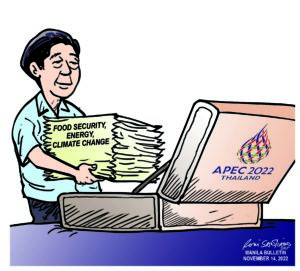From the Association of Southeast Asian Nations (ASEAN) summits in Cambodia, President Ferdinand R. Marcos, Jr. proceeds to participate in his first-ever Asia-Pacific Economic Cooperation (APEC) Economic Leaders Meeting in Bangkok, Thailand on Nov. 16-19, 2022 with the upbeat theme: Open. Connect. Balance.

“Open to all opportunities” underlines the Covid recovery scenario. APEC is well-poised to provide propulsion in jump-starting the resumption of open trade and investment, enhancing the business environment, advancing regional economic integration, and advancing regional economic cooperation by leveraging on digital acceleration and technology-driven innovation.
“Connect” is the most urgent imperative. APEC’s major challenge is to restore connectivity by resuming safe and seamless cross-border travel. This will reinvigorate the tourism and services sectors, facilitate business mobility and increase investments in health security.
“Balance” is the third focal point. The Asia-Pacific region has been “unbalanced” during the past two years. APEC’s member-economies have become more vulnerable to shocks. The harmful effects of global inequality and continuing climate change have become even more glaring. Hence, inclusivity and sustainability have risen to the top of the APEC agenda.
Home to more than 2.9 billion people and making up 60 percent of global gross domestic product, APEC’s significance in the global economy could not be overemphasized.
As President Marcos makes his debut on the APEC stage, he will propose forward pathways on tackling challenges on food security, energy, and climate change.
Since becoming president, he has highlighted the primacy of ensuring domestic food sufficiency in light of disruptions in the global supply chains. According to the Department of Foreign Affairs (DFA), Marcos will call for the need to “future proof” the region in responding to disruptions around the world.
Climate change is also at the forefront of his agenda, considering that the Philippines is one of the leading climate-vulnerable countries (CVCs) that bear the brunt of destructive typhoons and floods. While the APEC member-countries may have reaffirmed their commitment to COP 27, the Conference of the Parties of the United Nations Climate Change Conference in Sharm El Sheikh, Egypt, it is hoped that climate change concerns will be given adequate consideration in Bangkok. Significantly, there seems to be forward movement on fulfilling the commitment to provide compensatory relief assistance to CVCs like the Philippines.
On the whole, APEC initiatives enable the Philippines to enhance the competitiveness of domestic producers and sectors. These opportunities could be optimized by upgrading domestic facilities and aligning domestic regulations to meet global standards. These include behind-the-border barriers that limit the flow of goods and services and expand the coverage of businesses to overseas markets. Trade agreements in APEC also help firms gain access to cheaper inputs and more advanced technologies, which foster competition and increased productivity and growth.
Finally, President Marcos will also be meeting with the Filipino community in Thailand, numbering less than 20,000, but composed mainly of professionals who are able to contribute to the strengthening of people-to-people ties between Thais and Filipinos.

Leave A Comment